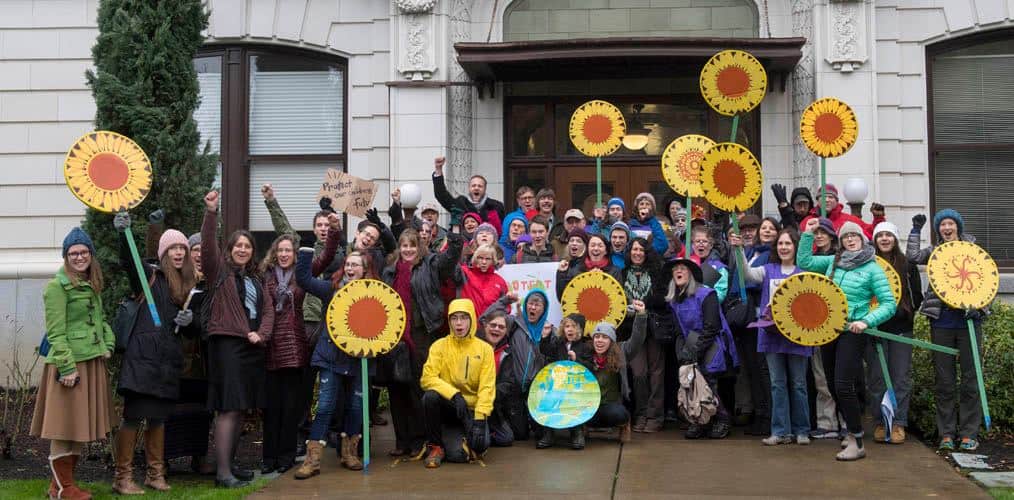
Partner Spotlight: Crag Law Center
It should be no surprise that at Secret Aardvark, we love and respect the environment. Our home is the Pacific Northwest, and we like to enjoy everything it has to offer—from taking Friday afternoons in the winter to go skiing to springtime hikes to summer music festivals in the great outdoors.
But these days, the environment can’t maintain itself, especially when it comes to defending itself against corporations with deep pockets. That’s why we love and support the Crag Law Center, who bill themselves as “legal aid for the environment.” Each year, Crag Law Center provides $3 million worth of free and low-cost legal services to people who work to protect our water, air, wildlife, forests, farmland, and communities.
We recently sat down with Executive Director & Staff Attorney Courtney Johnson to talk about the important work Crag does and what everyone should know about their legal options when defending the environment.

Aardvark: Can you tell us what Crag Law Center is and what your mission is?
Courtney: We are legal aid for the environment. So that means that throughout the Pacific Northwest, we are working with communities, tribes, environmental groups, grassroots activists, to protect our shared natural legacy. We split our work into three program areas, climate, the wild and communities.
We’re really client-focused, so we don’t have our own conservation agenda. We are really responding to and helping our clients solve the environmental problems that they are concerned about.
This will be our 20th year; we were founded in 2001. I guess I would say that we are lawyers. We really believe that with the power of a lawyer, standing with you, community groups can really stand up to large, large multinational corporations polluters, and also work to hold our government agencies accountable to the people.
A lot of the work that we do is challenging a government agency on decisions about how our natural resources are managed. So we’re really working to kind of hold the government accountable, make sure that our environmental impacts are brought to light and addressed. So really trying to make sure that where you see violations of air quality or water quality laws that we’re able to hold those polluters accountable.
Aardvark: What are some examples of projects Crag Law Center has worked on?
Courtney: We’ve done a lot of work fighting fossil fuel infrastructure projects. So there’s been a lot of proposals to export coal and natural gas along the Columbia river and along some of Oregon’s other ports.
Those projects tend to be really long running projects, very much a big coalition of landowners, tribes, climate activists, and coastal community members all coming together to challenge that. Because those companies have literally millions of dollars to throw at the project. So a lot of collaboration and a lot of working coalition with other groups.
We’ve been working a lot now to try to help promote more proactive policies. For example, the city of Portland adopted a local law that would prohibit expansion of fossil fuel infrastructure in the city. We worked with our clients to kind of help shape that and help defend that law when the fossil fuel industry was challenging that in court.
Aardvark: It sounds like it’s really hard to stand up against these big multimillion, if not billion dollar corporations. How can people win in these fights against corporations?
Courtney: So the Jordan Cove fight seems to be a success so far. They seem to be withdrawing their project. Another example of a big company that we fought was Nestle. When Nestle wanted to bottle water in the Gorge, we really helped that community fight that project off.
I think both are really an example of local people getting involved in organizing, and then the lawyers and Crag are really the support for that. So I would say that there’s a lot that individual people can do to get involved and have your voice heard and really make sure you are learning about some of the issues that are facing our communities.
When we’re there and getting into court, it’s really important that we’ve already built a record that shows what the impacts are and shows that the community really cares about this issue. So really just trying to support the activism and even for folks that don’t consider themselves activists—people who don’t consider themselves activists, but really just think of themselves as kind of caring about their community and the impact they can really have.
Aardvark: How can people support the Crag Law Center?
Courtney: As you know, we’re a nonprofit. We do our work for our clients for free or as close to free as we can. And so when individuals or companies like Secret Aardvark are giving to us, it really makes a huge difference because our biggest expenses are really just to pay the salaries of our attorneys.
You know, we’re taking nonprofit salaries. We’re not taking big firm salaries; our staff have really made a decision to kind of do this work for good and not take those fat checks you think of lawyers getting. So, we love Secret Aardvark. I mean, the stuff that Secret Aardvark has done for us and donating portions of sales is hugely appreciated. And, really, I think a lot of people in Portland and probably around the country love Secret Aardvark.
So to have our name kind of go along with Secret Aardvark’s name is really great. Because we often are working kind of behind the scenes—our clients are out there in front, fighting the fight and we’re behind them backing them up—it really makes a huge difference to have a business partner like Secret Aardvark elevate our presence and help get the word out about the work that we’re doing.
Aardvark: What in particular led you to environmental law, and what tends to lead others to places like Crag Law Center instead of the big law firms?
Courtney: It’s kind of interesting. Another big part of what we do is mentoring and training the next generation of environmental advocates for justice. So every summer we bring five to 10 interns to work with us. When we do those interviews, it’s really interesting to hear what motivates people.
I don’t think it’s really changed that much since I entered the field too—there’s just that sense of wanting to leave the world a better place than you found it, and to really have a positive impact and to do work that is fulfilling, that you feel good about at the end of the day.
When I went to law school, I, I knew that I could never really work at a big firm. That the corporate world was not where I was gonna end up. So I didn’t know exactly where it would end up, but I knew what I didn’t want.
So it’s interesting when you talk to people and people have different paths. What was the thing about nature, about, you know, animals or about, you know, wide open spaces or whatever it is? I think everyone kind of has their own little version of that thing that sparks joy, and that makes you want to do the work to protect these places.
They’re all probably a little bit different in some ways, but I think there is that common recognition of what this planet, this earth is giving to us to support us and wanting to do something to protect that for us and for future generations.
Aardvark: We know that Crag Law Center focuses on the Pacific Northwest, but what other organizations cater to the rest of the United States?
Courtney: First one that comes to mind is Southern Environmental Law Center. They work out of the Southeast. They’re a bigger organization that advocates for the West. They do some work out here West too, but they, I think, are based in Boise. So they are a little more in that kind of Intermountain West area.
EarthJustice is obviously the big national group that does kind of similar work on a national scale.
There’s a Midwest Environmental Advocates group as well. They work in the Great Lakes region.

